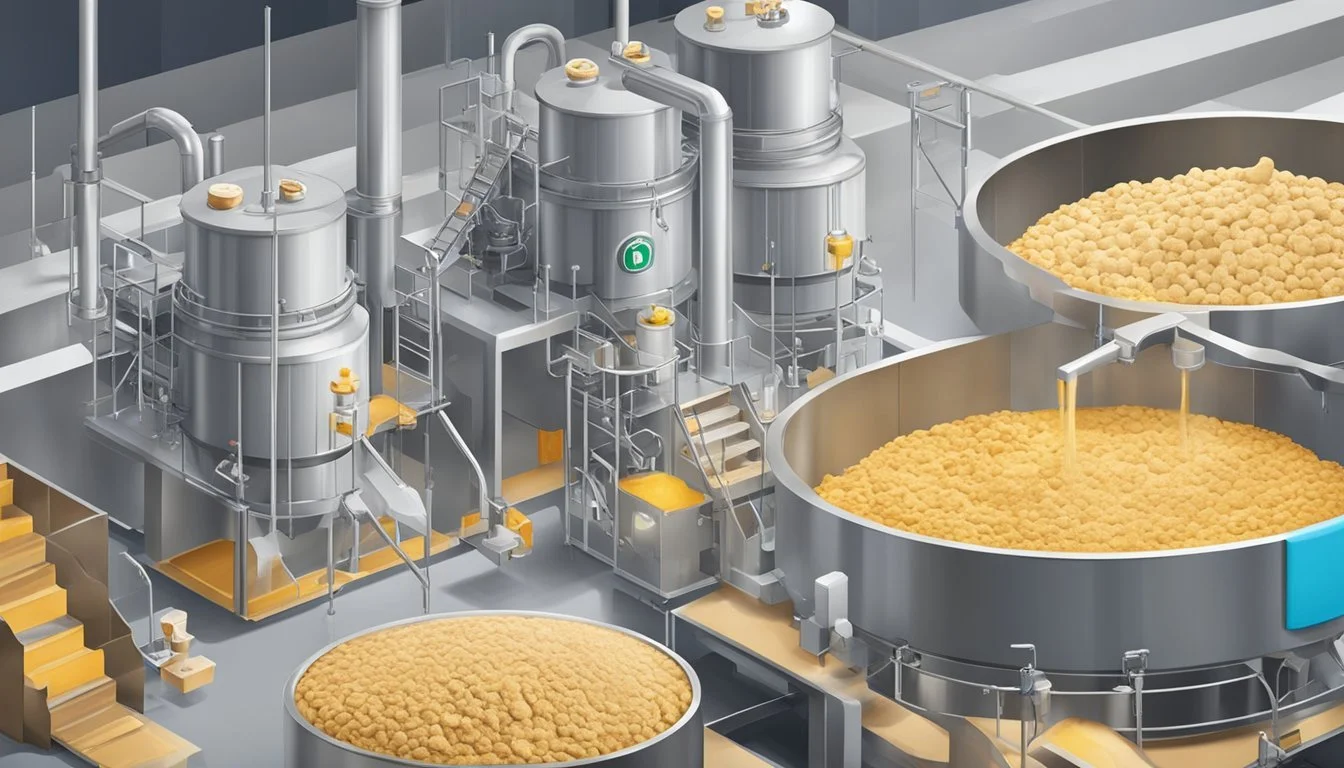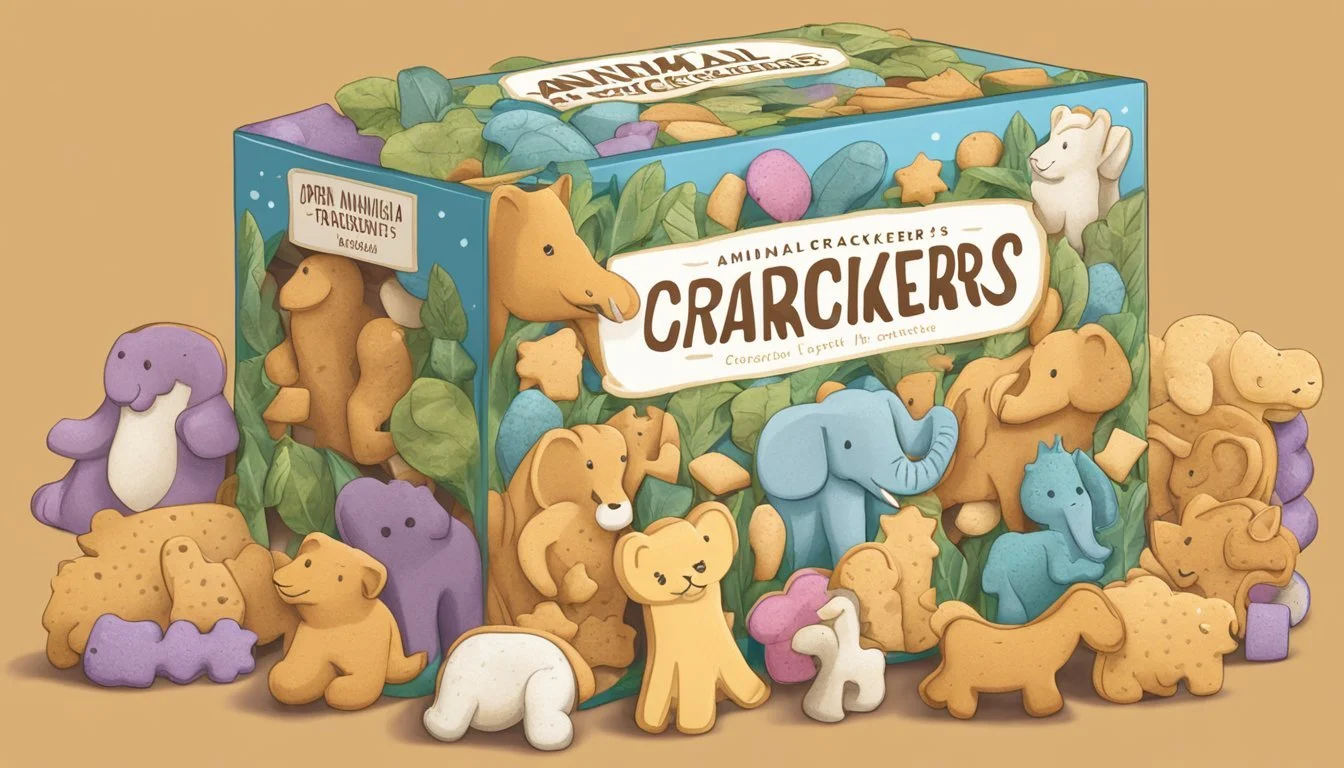Are Animal Crackers Vegan?
Unveiling the Ingredients and Ethics
When exploring the realm of vegan snacks, one might question the vegan status of classic treats such as animal crackers. Animal crackers have been a staple in children's diets and enjoyed by those of all ages due to their fun shapes and subtle sweetness. Vegan diets exclude all products of animal origin, which raises the question of whether these nostalgic snacks fall within vegan guidelines.
The vegan suitability of animal crackers largely depends on the ingredients used by different brands. Typically, traditional animal crackers are made without any direct animal-based ingredients, making them a seemingly ideal option for those following a vegan diet. However, some brands incorporate non-vegan ingredients such as milk, making those particular products unsuitable for vegans.
It is essential for consumers adhering to a vegan lifestyle to scrutinize ingredient lists, as certain ingredients like sugar or natural flavors can be controversial among vegans. While sugar itself is a plant-derived ingredient, the processing method involving bone char—often used to bleach sugar—renders it non-vegan for those who adhere to strict dietary guidelines. Similarly, natural flavors can originate from either plant or animal sources, requiring further investigation. As a result, vegans might prefer to opt for brands explicitly labeling their products as vegan to ensure compliance with their dietary choices.
The Vegan Diet and Principles
In the context of food choices like animal crackers, it is vital to understand the principles of the vegan diet and what constitutes vegan-friendly ingredients.
Understanding Veganism
Veganism is a lifestyle that seeks to exclude, as far as possible, all forms of exploitation of, and cruelty to, animals for food, clothing, or any other purpose. Those following a vegan diet avoid all animal products, including meat, dairy, eggs, and honey, as well as products like gelatin and lanolin that are animal-derived. A vegan lifestyle also extends to non-food items such as clothing and cosmetics, favoring alternatives that do not involve animal testing or components.
Common Vegan Ingredients
The foundation of a plant-based diet consists of ingredients that are sourced from plants, excluding any that are animal-derived. Here is a concise overview of staple vegan ingredients:
Grains: such as rice, wheat, oats, and barley.
Legumes: including beans, lentils, peas, and chickpeas.
Nuts and Seeds: like almonds, flaxseeds, and chia seeds.
Fruits and Vegetables: which form the core of a vegan diet.
Plant-based Milks: alternatives such as soy, almond, and oat milk.
Sweeteners: natural plant-based options like maple syrup and agave nectar.
To be considered vegan-friendly, food products must exclusively contain these or other plant-based ingredients, without traces of animal products or by-products.
When it comes to processed foods like animal crackers, vegans must scrutinize ingredients to ensure they align with these vegan principles, avoiding hidden animal-derived substances like certain flavorings or colorants that might not be immediately obvious.
Animal Crackers Overview
Animal crackers are a well-known snack that typically take the form of various zoo animals, appealing to both children and adults. They are generally recognized for their sweet taste and distinctive shapes, with many brands offering vegan options.
History of Animal Crackers
Dating back to the late 19th century, animal crackers originated in England before making their way to the United States. They quickly gained popularity as a snack and were even considered a novelty due to their unique animal shapes. The National Biscuit Company (Nabisco) began producing their version called Barnum's Animals in 1902, taking inspiration from the circus and capturing the hearts of American consumers.
Typical Ingredients in Animal Crackers
The basic composition of animal crackers usually includes:
Flour: Most commonly wheat flour, serving as the staple ingredient for the dough.
Sugar: Added to lend a sweet flavor.
Oil: Often used to provide texture and richness.
Here's a simplified list of ingredients typically found in animal crackers:
Wheat flour
Sugar
Oil (can vary between palm, soybean, or others)
Leavening agents (such as baking soda)
Natural flavor: A term which refers to flavoring substances derived from plants or animals; on ingredients lists, it does not specify the exact sources, which sometimes raises concerns for vegans.
Salt
These ingredients combined create the simple yet enjoyable taste and texture of animal crackers. It's important for those following a vegan diet to review the ingredients list as some brands might include milk or eggs, deterring the product from being vegan. However, many modern brands have adapted their recipes to cater to vegan diets, excluding any animal-derived ingredients.
Evaluating Animal Crackers for Vegans
When assessing whether animal crackers are suitable for a vegan diet, it is crucial to look at the specific ingredients used. Some animal crackers contain non-vegan elements, while others are made with vegan-friendly ingredients.
Non-Vegan Ingredients Commonly Found
Many animal crackers may include ingredients that are not suitable for those following a strict vegan diet. Common non-vegan elements to look out for include:
Dairy Products: These can come in the form of milk, whey, or other dairy derivatives.
Eggs: Some brands may contain egg or egg whites in their recipes.
Honey: Occasionally used as a sweetener.
Gelatin: A lesser common, but potential animal-based ingredient.
Vegan-Friendly Alternatives
For vegans, there are alternatives that use plant-based ingredients. Key ingredients that make certain brands of animal crackers vegan-friendly are:
Absence of Animal Products: No dairy, eggs, or honey.
Natural Flavors: Some may contain 'natural flavor' which may need further investigation to ensure they are not derived from animal sources.
Sugar: Although some vegans avoid refined sugar processed with bone char, many animal crackers brands use unrefined or organic sugar acceptable to most vegans.
Vegans should always check the packaging for potentially non-vegan ingredients and may need to contact manufacturers directly for clarification on specific items like 'natural flavors.'
Specific Brands and Varieties
When assessing whether animal crackers are vegan, one must look closely at the brands and varieties available. Each brand has its own recipe, which can affect the vegan status of their animal crackers.
Mainstream Brands
Nabisco's Barnum's Animal Crackers are a traditional choice. Historically, they contained milk, making them non-vegan. However, in recent years, their formula has changed. As of the last known update, they no longer list dairy or eggs in their ingredients, making them suitable for non-strict vegans who do not avoid sugar.
Stauffer's Animal Crackers offer a slightly more complicated vegan status. Their Original and Chocolate varieties contain ingredients that might concern some vegans, such as sugar and natural flavors, while their Iced variety also contains artificial colors.
Keebler's brand, known for a wide range of cookies and crackers, also produces animal crackers. They have not been highlighted as vegan-friendly in the available data and should be checked for non-vegan ingredients like milk or eggs before consumption by vegans.
Specialty and Vegan Brands
Trader Joe’s Organic Animal Crackers and Costco's Kirkland Signature Organic Animal Crackers are two brands that cater to a more health-conscious audience and avoid using animal-derived ingredients in their animal crackers, making them good options for those following a strict vegan diet.
Brand A and Brand C, while not specified in the data provided, would need individual assessment to determine their vegan status, as formulations can vary greatly among different brands.
Glutino Animal Crackers are another specialty brand that avoids the use of dairy, eggs, and other animal-derived ingredients. They are generally considered safe for vegans.
Lastly, for those looking for a specific vegan product, Brand A (if assumed to represent a hypothetical vegan-specific brand), would likely provide animal crackers created with the vegan consumer in mind, free from ingredients like milk, eggs, and other animal derivatives.
Ingredients Detail and Assessment
When evaluating whether animal crackers are vegan, it's crucial to scrutinize the ingredients they contain. This analysis focuses on the individual components to determine their vegan status.
Sugar and Its Derivatives
Cane Sugar: Often used in animal crackers. Its vegan status may be questionable if processed with bone char, which some brands may use for whitening.
Organic Cane Sugar: A vegan-friendly option as it’s typically processed without bone char.
High Fructose Corn Syrup: A sweetener derived from corn, considered vegan.
Brown Rice Syrup & Organic Brown Rice Syrup: Plant-based sweeteners, both considered vegan.
Flours and Grains
Enriched Flour: Mainly wheat flour with added vitamins and minerals. Vegan, unless vitamins from animal sources are added.
Yellow Corn Flour: A vegan flour alternative, used in some cracker varieties.
Oils and Fats
Vegetable Oil: Can include a variety of plant oils. Vegan-friendly, but source should be considered. May include:
Canola Oil: Extracted from rapeseed and vegan.
Palm Oil: Vegan, yet controversial due to environmental concerns.
Soybean Oil: Derived from soybeans, vegan.
Coconut Oil: Plant-based and vegan.
Olive Oil: Made from pressed olives, suitable for vegans.
Additives and Flavorings
Artificial Flavors: Synthetically created and generally vegan, though origins can vary.
Natural Flavors: Derived from natural sources; could be plant or animal-based, requiring further investigation.
Soy Lecithin: An emulsifier often derived from soy and considered vegan.
Health and Dietary Considerations
When evaluating whether animal crackers are suitable for a vegan diet, one must examine both their nutritional content and potential allergens. Consumers often look for healthy options and may have specific dietary restrictions that influence their choices.
Nutritional Content
Animal crackers are often considered a low-fat snack, and some brands fortify their products with essential nutrients. For example, certain animal crackers may contain added calcium carbonate, which is beneficial for bone health, or reduced iron, which is important for those needing to increase their iron intake. However, they are generally not a significant source of vitamins or minerals like folic acid unless fortified. While they can offer some nutritional benefits, they should not be relied upon as a primary source of nutrients.
Allergens and Dietary Restrictions
Animal crackers can contain a variety of allergens, the most common being wheat due to the presence of flour. Some brands may also include milk products, which would make them unsuitable for vegans and individuals with dairy allergies. Additionally, although not an allergen, it's important to note that the sugar used in some animal crackers might be processed with bone char, raising concerns for those on a strict vegan diet. Consumers should be mindful of salt content in their diet and check labels, as animal crackers can vary in sodium levels.
Manufacturing Processes
In the context of animal crackers, the manufacturing processes often determine their vegan status. This examination will consider both the production techniques and the ethical considerations associated with the creation of these snacks.
Production Techniques
The manufacturing of animal crackers involves several steps from dough mixing to baking. The ingredients typically include flour, sugar, and flavors. Vegan brands ensure that all ingredients are plant-based, with the absence of milk, eggs, or honey. It is essential for manufacturers to clearly label products with a "vegan" designation when applicable. This lets consumers know if animal-derived ingredients are absent from both the product and the production line.
The packaging of animal crackers also reflects their vegan status with appropriate labeling and, in some cases, also contains information on sustainability.
Ethical Considerations
Ethical considerations are paramount in determining if animal crackers are truly vegan. This includes ensuring that the products are cruelty-free and do not involve testing on animals at any stage.
For assurance, consumers often look for certifications such as "Certified Vegan," which indicate that the product and its manufacturing process abide by vegan standards, including considerations for animal welfare. Such certifications often require that the facility does not engage in cross-contamination with non-vegan products, as is the case with some animal crackers manufacturers.
It's worth noting that even if the ingredients are vegan, some consumers may still be concerned about indirect aspects like the treatment of labor and environmental impact during production and packaging.
Consumer Information
When purchasing animal crackers, consumers should pay close attention to ingredient labels and brand specifications to determine their vegan status. Some ingredients, such as sugar, may be of concern for strict vegans due to processing methods that can involve bone char.
Label Reading Guide
Consumers will find that ingredient labels provide the most crucial information regarding whether a box of animal crackers adheres to vegan standards. They should be mindful of the following:
Sugar: Some vegans avoid sugar processed with bone char. Consumers can look for brands that specify the use of unrefined sugar or sugar from a vegan process.
Dairy Products: Avoid brands that list milk or other dairy derivatives.
Natural flavors: This term can be ambiguous, and it might be necessary to contact the manufacturer to clarify the source of these flavors.
Ingredient Vegan-Friendly Notes Sugar Sometimes Check if it's from a vegan process Milk No Common non-vegan ingredient Natural Flavor Sometimes Clarification from the manufacturer may be necessary
Frequently Asked Questions
Are all brands of animal crackers vegan? No, not all brands are vegan. Some, like Austin’s Zoo Animal Crackers, contain milk, while others may be vegan-friendly.
What should non-strict vegans look for in animal crackers? Non-strict vegans may be less concerned with sugar sourcing and natural flavors. Most animal crackers that do not contain direct animal products can be suitable for non-strict vegans.
Where in the grocery store can consumers find vegan animal crackers? Vegan animal crackers can often be found in the same section as other crackers and cookies. If available, some brands might be specifically labeled as vegan in the health food section.
How can consumers inquire about questionable ingredients in animal crackers? They can contact the brand's customer service for clarifications regarding the source of ingredients like sugar and natural flavors.
Alternative Options
For those seeking vegan alternatives to traditional animal crackers, they have the option of creating their own homemade recipes or choosing from a range of commercial vegan-friendly brands. Both approaches ensure that animal crackers are cruelty-free and align with vegan dietary choices.
Homemade Recipes
Individuals can prepare vegan animal crackers at home using non-GMO ingredients and cruelty-free methods. Homemade recipes allow for flexibility and control over what goes into their snacks. By selecting plant-based ingredients, ensuring no animal products like milk or honey are used, one can create a batch of animal-friendly treats. Recipes can be found online that provide step-by-step instructions for crafting these snacks in the comfort of one's own kitchen.
Commercial Vegan-Friendly Brands
Those preferring the convenience of store-bought options can choose from brands such as Earth Balance and Back to Nature. These brands are known for their commitment to vegan-friendly products and often utilize non-GMO ingredients in their animal crackers:
Barnum's Animal Crackers: Recently made without animal-derived ingredients, thereby offering a vegan-friendly option.
Earth Balance: Offers a variety of snacks including vegan crackers that are marketed as non-GMO and free from animal products.
Back to Nature: Provides a selection of crackers that cater to the vegan diet, focusing on simplicity and wholesome ingredients.
By opting for these brands, consumers can enjoy the nostalgic experience of animal crackers without compromising their vegan principles.
The Broader Impact of Food Choices
When consumers select foods like animal crackers, they are not just choosing a snack; their choices ripple through environmental and ethical spheres.
Environmental Considerations
The production of food, particularly products that include dairy, carries a significant environmental impact. The agriculture sector contributes to greenhouse gas emissions, with animal agriculture being a notable source. Vegan snacks, such as some varieties of animal crackers that omit dairy and other animal-derived ingredients, present a cruelty-free alternative that can help reduce this impact. Choosing vegan options is one way consumers can support sustainable practices that help mitigate deforestation, water pollution, and carbon footprint.
Animal Rights and Vegan Ethics
The choice to consume vegan products, including animal crackers, aligns with a broader animal welfare perspective. Vegan ethics advocate for cruelty-free alternatives to avoid supporting industries that may harm animals. By opting for animal crackers that do not contain dairy or other animal-derived ingredients, consumers support the principle of reducing harm to animals, which is core to vegan ethics. This choice reflects an understanding that each purchase can either contribute to or help alleviate the demands placed on animal agriculture, which in turn impacts the welfare of animals.
Conclusion
Vegan-friendly options among animal crackers are available; consumers seeking these alternatives should scrutinize ingredient lists. Most brands have shifted towards offering products that align with a vegan lifestyle, excluding animal-derived ingredients. However, exceptions exist—certain brands continue to use milk or milk derivatives in their recipes.
Ingredients to watch for in determining vegan status include:
Milk and milk derivatives
Eggs or egg products
Natural flavors (which may be animal-derived)
It is also informative to note that some vegans may have concerns regarding sugar processing or artificial colors, which could impact an animal cracker's vegan status.
For assurance, look for:
Vegan certification labels
Explicit statements of being 'Vegan' on packaging
In summary, while animal crackers can be enjoyed by those following a vegan diet, vigilance is required to ensure individual products meet vegan standards. It is recommended that those seeking vegan-friendly animal crackers conduct research and select brands that transparently align with vegan principles.











